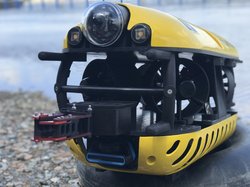Today's oceans contain tons of waste, most of which can be found underwater. While a lot of effort has been put into the collection of maritime surface waste, to this day only few attempts were made at collecting litter on the sea floor. Additionally, most submarine measures require human divers, complicating such procedures even further.
As a Team of researchers at TUM and in collaboration with partners across Europe, for the SeaClear project we are working on strategies to automate the collection of underwater waste. For this purpose, we develop concepts for autonomous robots that can support us in this task.
Resulting are a number of interesting research questions in a diverse field of topics:
- Hardware: The collection of waste requires the development of appropriate mechanical grippers.
- Robotics and Control: Modelling and control of underwater robots and the cooperation with humans call for novel theoretical concepts.
- Artificial Intelligence: Bad vision underwater in addition to many unknown disturbances opens up several interesting applications for machine learning.
